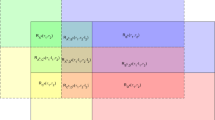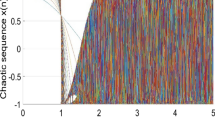Abstract
This paper investigates the performance of direct‐sequence code‐division multiple‐access (CDMA) communication systems in Gaussian noise channels using binary and M‐ary noncoherent signaling schemes with complex signature sequences. Differential‐phase‐shift‐keyed (DPSK) signaling with differentially coherent demodulation and frequency‐shift‐keyed (FSK) signaling with noncoherent demodulation are considered. Upper and lower bounds are presented for the probability of bit error (p.b.e.) of binary DPSK and binary FSK systems when the number of users is small. Simulation and Gaussian approximation are used to obtained the p.b.e. when the number of users is large. Two types of complex sequences (FZC and 4‐phase sequences) and one type of binary sequences (Gold sequences) are used for evaluating numerical results. Results show that complex sequences outperform binary sequence when the number of users is small. However, as the number of users gets large, all sequences have similar performances. These suggest that complex sequences should be used when the number of users is small, but binary sequences should be used when the number of users is large, as binary sequences are easier to generate.
Similar content being viewed by others
References
S. Boztas and V. Kumar, Near-optimal four-phase sequences for CDMA, IEEE Transactions on Information Theory 38 (May 1992) 1101-1113.
D.C. Chu, Polyphase codes with good periodic correlation properties, IRE Transactions on Information Theory 18 (July 1972) 531-532.
R.L. Frank and S.A. Zadoff, Phase shift pulse codes with good periodic correlation properties, IRE Transactions on Information Theory 8 (1962) 381-382.
E.A. Geraniotis, Performance of noncoherent direct-sequence spread-spectrum multiple-access communications, IEEE Journal on Selected Areas in Communications 3 (September 1985) 687-694.
R. Gold, Optimal binary sequences for spread spectrum multiplexing, IEEE Transactions on Information Theory 13 (October 1967) 619-621.
R.T. Hsu and J.S. Lehnert, Continuous phase-coded direct-sequence spread-spectrum multiple-access communications, in: Proc. of the Internat. Phoenix Conf. on Computers and Communications (March 1991) pp. 441-446.
A.W. Lam and F.M. Ozluturk, Performance bounds for DS/SSMA communications with complex signature sequences, IEEE Transactions on Communications 40 (October 1992) 1607-1614.
J.S. Lehnert, An efficient technique for evaluating direct-sequence spread-spectrum multiple access communications, IEEE Transactions on Communications 37 (August 1989) 851-858.
J.S. Lehnert and M.B. Pursley, Error probabilities for binary direct-sequence spread-spectrum communications with random signature sequences, IEEE Transactions on Communications 35 (January 1987) 87-98.
N. Nazari and R.E. Ziemer, Computationally efficient bounds for the performance of direct-sequence spread-spectrum multiple-access communications in jamming environments, IEEE Transactions on Communications 36 (May 1988) 577-587.
F.M. Ozluturk, Coherent and noncoherent DS/SSMA communications with complex signature sequences: Error and acquisition performances, Ph.D. dissertation, University of Massachusetts (1994).
F.M. Ozluturk, S. Tantaratana and A.W. Lam, Performance bounds for DS/SSMA systems with binary noncoherent signaling schemes, in: Proc. of the MILCOM Conf., Boston (October 1993) pp. 214-218.
F.M. Ozluturk, S. Tantaratana and A.W. Lam, Performances of DS/SSMA systems with MPSK signaling and complex signature sequences, IEEE Transactions on Communications 43 (February–April 1995) 1127-1133.
R.F. Pawula, S.O. Rice and J.H. Roberts, Distribution of the phase angle between two vectors perturbed by Gaussian noise, IEEE Transactions on Communications 30 (August 1982) 1828-1841.
M.B. Pursley, Performance evaluation for phase-coded spread-spectrum multiple-access communication — Part I: System analysis, IEEE Transactions on Communications 25 (August 1977) 795-799.
S. Stein, Communication Systems and Techniques (McGraw-Hill, New York, 1966).
Author information
Authors and Affiliations
Rights and permissions
About this article
Cite this article
Ozluturk, F.M., Tantaratana, S., Lam, A.W. et al. Performances of DPSK and FSK CDMA systems with complex signature sequences. Telecommunication Systems 10, 205–277 (1998). https://doi.org/10.1023/A:1019171101367
Issue Date:
DOI: https://doi.org/10.1023/A:1019171101367




